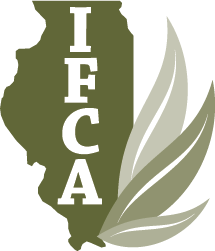Dicamba Use Right Now: Truth, Rumors, Your Risk
2. The Illinois Pesticide Act and the Illinois Pesticide Regulations require that the Department may only register products for use in Illinois that are also federally registered. The USEPA registration for these products were vacated by the federal court, effective June 3. Not all states have regulations as clear as Illinois does, hence their determinations that these products can continue to be used until they get a clear cancellation order from USEPA, rather than from the court. Surrounding states that continue to alllow use is frustrating to us in Illinois, but even ARA advised retailers to cease using these products until the registrants advise it is legal to do so because of the federal ramifications.
Here is what the Illinois regulations state:
Title 8, Chapter I, Subchapter i, Part 250 Illinois Pesticide Act:
Section 250.30: Registration of Pesticides
IDA issued this statement on their website on June 5: Pursuant to FIFRA, all pesticides sold, used or distributed in the United States must be registered with the USEPA. Therefore, effective June 3, 2020, based on the Ninth Circuit's ruling, Xtendimax, FeXapan, and Engenia cannot be sold, used or distributed as their registrations have been vacated. While the Department has the authority to regulate the sale and use of pesticides within the State, it cannot permit any sale or use without a valid FIFRA registration. The Department acknowledges and is sympathetic to the challenges that the Court's decision will pose to the industry.
3. IFCA spoke again this morning (June 8) with IDA management. Nothing has changed since last Friday and their interpretation of the situation has not changed. Therefore, at this point in time, the sale, distribution and use (application) of these 3 products in Illinois is not allowed by the Illinois Pesticide Act. We realize that IFCA is among the few ag organizations informing people of the IDA statement, but it is a fact and you deserve to know the good, the bad and the ugly.
4. For ag retailers, we know this up-ends your commercial application plans and Xtend growers are upset with the loss of legal use of these products on their soybean crop. Rumors are rampant that something is going to change this week. Maybe something will change and if that happens word will travel fast and IFCA will let you know what any potential changes mean.
5. For our members in Illinois, we advise you to weigh the risks of continuing the sale, distribution or commercial application of these products. Using these products after June 3 is technically not allowed in Illinois. If someone files a misuse complaint and IDA investigates, the product and date of application is required on the record. Falsifying or failing to keep records of an application is an even more serious violation of the Illinois Pesticide Act; knowingly providing false information to IDA is yet another offense. All of these are serious.
6. Finally, as a business we advise you to investigate with your insurance provider what protection they can or can't provide to you if there is a sale, distribution or use of the 3 dicamba products that results in some kind of misuse finding or claim against your business. IDA will investigate misuse; those cases and findings are subject to the Freedom of Information Act. While IDA penalties are serious, many times these things end up in civil court and thus the liability for the ag retailers is very concerning. The registrants stopped sale of these products immediately after the court ruling.
We understand your frustration. Many options are being explored at very high levels. Feel free to contact me at (309) 826-3236 with questions or jeanp@ifca.com.
